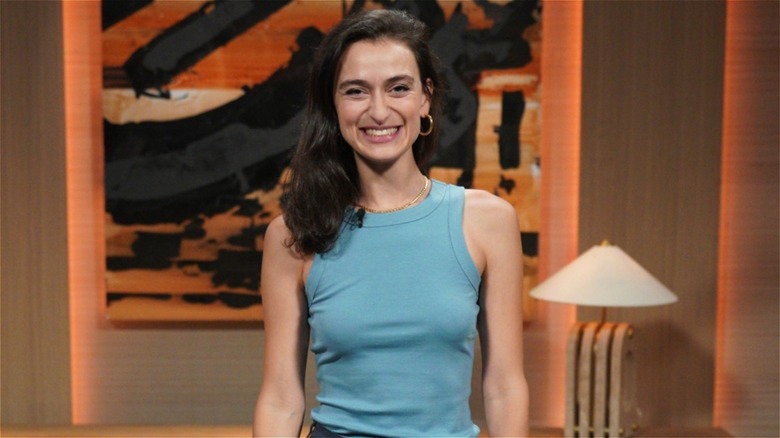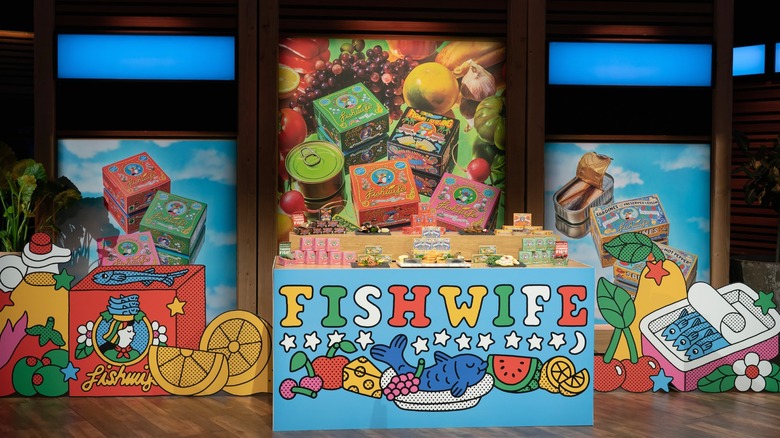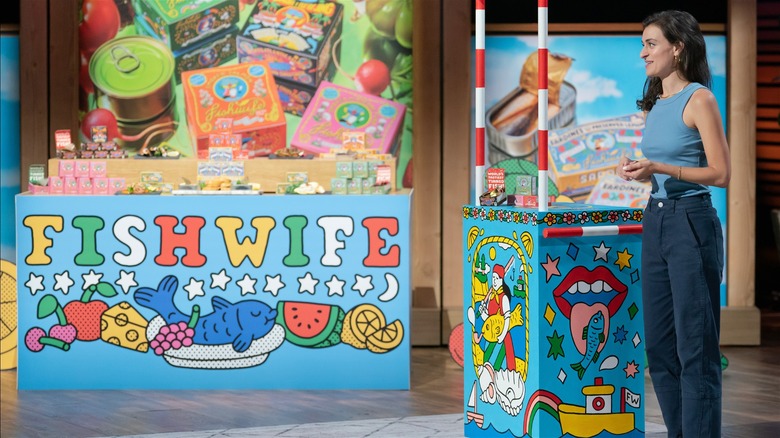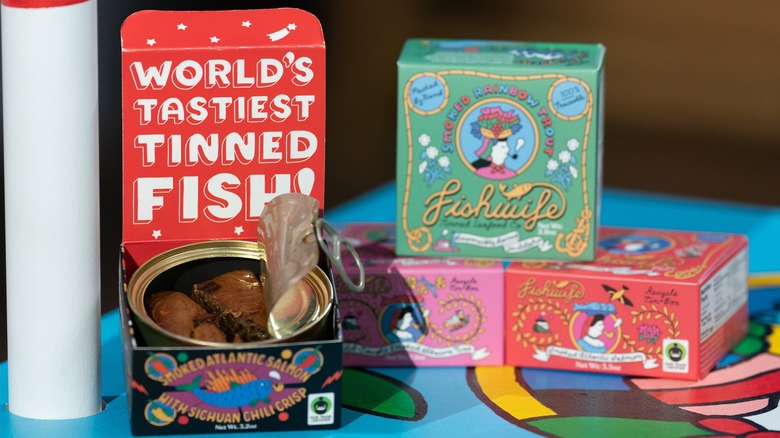3 Details To Know About Fishwife From Shark Tank
For most American consumers, tinned fish used to conjure images of tuna salad, sardines, and Caesar salad-boosting anchovies. In other words, unglamorous and affordable sources of protein. In the last few years, however, the tinned fish industry has undergone a sea of change (pardon the pun). Bespoke cans of mackerel, cockles, and squid — the oils sometimes adorned with bursts of citrus and pickled peppers — have become a common fixture on charcuterie boards and even restaurant menus. It's a trend that points to the tins' primacy in the tapas and pintxos-centric Iberian peninsula — and a far cry from the humble tuna sandwich.
For further proof of the tinned fish wave, look no further than the sales numbers. In 2018, the canned seafood industry netted $2.3 billion. By 2023, it had grown to over $2.7 billion. Social media is a window into the niche ingredients' popularity as well. Tinned fish reviews and recipes account for more than 30 million views on TikTok.
Fishwife Tinned Seafood Co. is one of the major players in the burgeoning tinned fish scene. The company has earned attention from publications like Ad Age, which wrote in 2023, "Fishwife is one of Ad Age's Hottest Brands for breathing life into a bland grocery category." Since its inception in 2020, Fishwife has produced tins of smoked rainbow trout, albacore tuna, and salmon. On January 12, the company is bringing its signature tinned fish to "Shark Tank" in the hopes of hooking an investor.
Here are a few facts you need to know about the company as it heads into the Tank.
Fishwife was born during the pandemic
Tinned fish popularity saw an uptick during the early days of the COVID-19 pandemic when consumers increasingly reached for nutritious, shelf-stable groceries. Fishwife co-founders Becca Millstein and Caroline Goldfarb were two such consumers when they were quarantining together in Los Angeles. While out hiking in early 2020, the pair realized that there wasn't an American company that filled this new market's needs. Fishwife, they decided, would fill that void while also committing to ethical sourcing.
"It's terrible to say," Millstein recalled to Eater, "But had the pandemic not happened, I doubt Fishwife would exist because we would not have had the time and bandwidth to come up with the idea and see it to fruition."
Millstein and Goldfarb named their company Fishwife after the 16th-century term for the wives and daughters of fishermen who accompanied them to the market. "The term gradually evolved into [a] gendered insult for women who were brash, foul-mouthed, and brassy," reads the Fishwife website. "We relate."
The duo also wanted to pay homage to their own tinned fish-loving ancestors. Millstein's grandparents embraced the cheap eats in 1930s Brooklyn and Goldfarb's Iranian mother lovingly served sardines and tuna. "It feels so different than other trends to me, because it's so timeless and an important part of everyone's pantry," Goldfarb told Nylon. "To me, it's beyond a trend — it's an indelible part of food culture."
Fishwife is Becca Millstein's foray into the food industry
Before Becca Millstein and Caroline Goldfarb launched Fishwife in 2020, neither had any experience in food production. Millstein's background was in the music industry, and Goldfarb was a TV writer, having worked for "The Eric Andre Show" and "The Late Late Show with James Corden." Millstein has taken the reins at Fishwife full-time and now works as the company's CEO. For a time, she was Fishwife's only full-time employee. Goldfarb, meanwhile, has continued to focus on her writing career, contributing to "Chad" and "The Sex Lives of College Girls."
Millstein now heads up a small team at Fishwife, but she still wears many hats as CEO. She rattled off her responsibilities in the aforementioned Eater interview from 2022. "That includes supply chain (sourcing raw product, procurement, and management of our cannery and fulfillment partners), marketing (creative direction, social media, and design), partnerships, collaborations, product development, fundraising, team management, and more," Millstein said.
Running a food production company comes with a steep learning curve, and Millstein has been lucky to find mentors in the industry. "Adam Eskin, the founder of Dig, is my closest advisor and he has been instrumental in guiding my growth as a leader of this company," Millstein continued. She also works closely with illustrator Danny Miller, who designed the eye-catching Fishwife aesthetic.
Fishwife is all about collaborating
If Fishwife feels like one of the more ubiquitous tinned fish companies, that partly has to do with its seemingly constant stream of collaborations with like-minded brands. To date, Fishwife has partnered with olive oil purveyors Brightland; bespoke vinegar brand Acid League; kitchenware company Fredericks & Mae; candlemakers MYH Soy Candle Co.; and even the in-demand jewelry designer, Susan Alexandra. In 2022, Fishwife and Chinese home-cooking brand Fly By Jing launched a line of tinned smoked salmon with Sichuan chili crisp. The three-pack retails on Fishwife's website for $39, where it has racked up over 250 five-star reviews.
Becca Millstein credits her background in music brand partnerships with inspiring her insatiable appetite for collabs. "A big agency is an intense professional environment, to put it mildly, but I found it to be wildly fascinating, finding brand deals for clients and negotiating the heck out of them," Millstein continued in the same Eater interview. "Which is probably why Fishwife does like, five partnerships a week."
When it comes to Fishwife's brand partnerships, the sky's the limit. Millstein has admitted, however, that her real dream is to expand to different species of seafood that are still high quality, scalable, and within an attainable price point — an aspiration that could come to fruition with the help of a Shark. Here's hoping Fishwife isn't dead in the water when it makes its "Shark Tank" debut.
What happened to Fishwife on Shark Tank?
Becca Millstein comes on "Shark Tank" looking for a $350,000 investment for 4% equity in Fishwife, and her impressive presentation leaves her with plenty of unique options when it comes to choosing a deal.
Daymond John makes her an investment offer of $350,000, but wants 15 cents of every can of Fishwife sold in perpetuity. Candace Nelson joins forces with Lori Greiner, offering the same amount of money as John for a 10% stake — and Greiner is encouraged by the fact that a former "Shark Tank" investment of hers, Boarderie, could start including Fishwife in their charcuterie and cheese boards. Kevin O'Leary suggests a loan for the $350,000 that Millstein is after with an 11% interest on the repayment, as well as a 5% stake for himself. The only shark to not jump in on the feeding frenzy is Mark Cuban, who congratulates Millstein on her work, but says the product just isn't a fit for him.
Millstein clearly has her heart set on making a deal with the two women sharks, and counters their 10% equity offer with 6% equity plus 1% advisory shares to both Greiner and Nelson vested over two years. The sharks agree and Millstein gets her deal.




